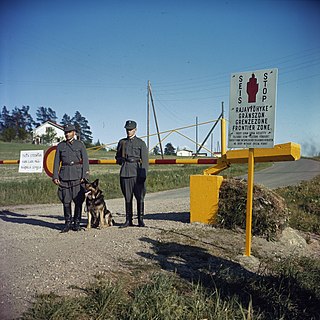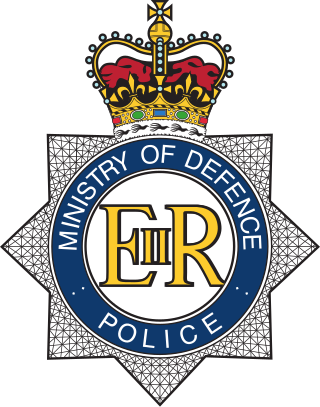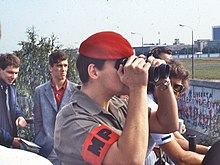
The Netherlands Armed Forces are the military forces of the Kingdom of the Netherlands. The armed forces consist of four service branches: the Royal Netherlands Navy, the Royal Netherlands Army, the Royal Netherlands Air Force and the Royal Netherlands Marechaussee. The service branches are supplemented by various joint support organizations. In addition, local conscript forces exist on the Dutch Caribbean islands of Aruba and Curaçao. These operate under the auspices of the Royal Netherlands Navy and the Netherlands Marine Corps. The armed forces are part of the Ministry of Defence.

The British Armed Forces are the military forces responsible for the defence of the United Kingdom, its Overseas Territories and the Crown Dependencies. They also promote the UK's wider interests, support international peacekeeping efforts and provide humanitarian aid.

The Portuguese Armed Forces are the military of Portugal. They include the General Staff of the Armed Forces, the other unified bodies and the three service branches: Portuguese Navy, Portuguese Army and Portuguese Air Force.

A coast guard or coastguard is a maritime security organization of a particular country. The term embraces wide range of responsibilities in different countries, from being a heavily armed military force with customs and security duties to being a volunteer organization tasked with search and rescue without law enforcement authority. In most countries, a typical coast guard's functions are distinct from those of the navy and the transit police, while in certain countries they have similarities to both.

Military police (MP) are law enforcement agencies connected with, or part of, the military of a state. In wartime operations, the military police may support the main fighting force with force protection, convoy security, screening, rear reconnaissance, logistic traffic management, counterinsurgency, and detainee handling.

The Royal Military Police (RMP) is the corps of the British Army responsible for the policing of army service personnel, and for providing a military police presence both in the UK and while service personnel are deployed overseas on operations and exercises. Members of the RMP are often known as 'Redcaps' because of the scarlet covers on their peaked caps and scarlet coloured berets.

The Royal Navy Police (RNP) is the service police branch of the Royal Navy and Royal Marines. Members of the RNP enforce service law and discipline.

The Royal Air Force Police (RAFP) is the service police branch of the Royal Air Force, headed by the provost marshal of the Royal Air Force. Its headquarters are at RAF Honington and it deploys throughout the world to support RAF and UK defence missions.

The Royal Marines Police, or Royal Marines Police Troop is the Royal Marines element of the Royal Navy Police and the military police arm of the Royal Marines. Members of the RM Police enforce service law and discipline.

The Gibraltar Defence Police (GDP) is a civil police force which provides a policing and security service for the Ministry of Defence in Gibraltar. Prior to 17 December 2009 it was known as the Gibraltar Services Police (GSP).

His Majesty's Naval Service is the United Kingdom's naval warfare and maritime service. It consists of the Royal Navy, Royal Marines, Royal Fleet Auxiliary, Royal Naval Reserve, Royal Marines Reserve and Naval Careers Service. The Naval Service as a whole falls under the command of the Navy Board, which is headed by the First Sea Lord. This position is currently held by Admiral Sir Ben Key. The Defence Council delegates administration of the Naval Service to the Admiralty Board, chaired by the Secretary of State for Defence.

The United Kingdom's Strategic Command (StratCom), previously known as Joint Forces Command (JFC), manages allocated joint capabilities from the three armed services.

A border guard of a country is a national security agency that ensures border security. Some of the national border guard agencies also perform coast guard and rescue service duties.

The Sovereign Base Areas Police is the local civilian police force for the British controlled Sovereign Base Areas (SBA) of Akrotiri and Dhekelia in Cyprus.

The Military Provost Guard Service (MPGS) is responsible for maintaining physical security at British Armed Forces locations throughout Great Britain. It is one of three constituent units of the Adjutant General's Corps Provost Branch. The Provost branch is the responsibility of the Provost Marshal who is a Brigadier from the Royal Military Police. The MPGS also works alongside the unarmed Ministry of Defence Guard Service (MGS). In Northern Ireland, armed security at Ministry of Defence establishments is provided by the uniformed civilian Northern Ireland Security Guard Service in a similar manner to that of the MPGS in Great Britain.

Provosts are military police (MP) whose duties are policing solely within the armed forces of a country, as opposed to gendarmerie duties in the civilian population. However, many countries use their gendarmerie for provost duties.

In many countries, particularly those with a federal system of government, there may be several law enforcement agencies, police or police-like organizations, each serving different levels of government and enforcing different subsets of the applicable law.

Head of the Armed Forces is the position of the sovereign of the United Kingdom as commander-in-chief of the British Armed Forces. Supreme military authority vests in the monarch and extends to the exercise of several personal prerogatives. However, routine administration of the military is delegated as a matter of law to the Defence Council of the United Kingdom, a body officially charged with the direction and command of the Armed Forces. As the Defence Council and its service boards are all a part of the Ministry of Defence, which itself is a ministerial department of the Government of the United Kingdom, the prime minister makes the key decisions on the use of the Armed Forces, while the secretary of state for defence assists the prime minister in the development of defence policy and administers the day-to-day military operations.

The Ministry of Defence Police (MDP) is a civilian special police force which is part of the United Kingdom's Ministry of Defence. The MDP's primary responsibilities are to provide armed security and counter terrorism services to designated high-risk areas, as well as uniformed policing and limited investigative services to Ministry of Defence property, personnel, and installations throughout the United Kingdom. The MDP are not military police. Service personnel often refer to the MDP by the nickname "MOD plod".




















